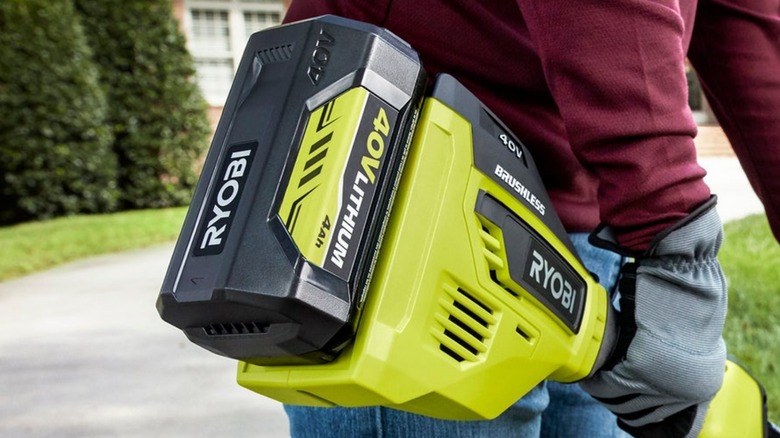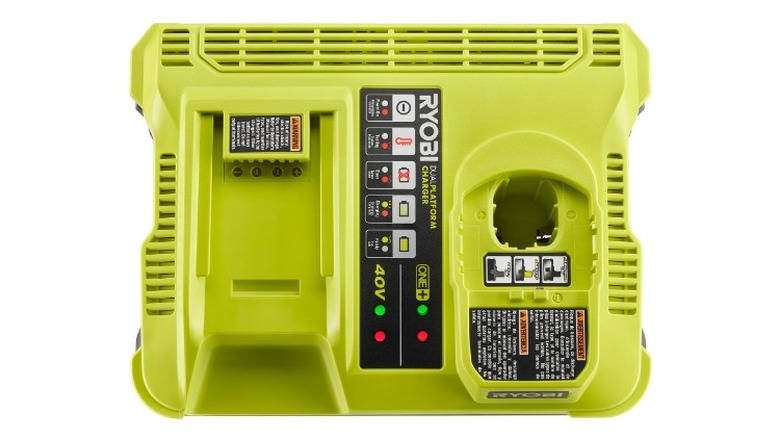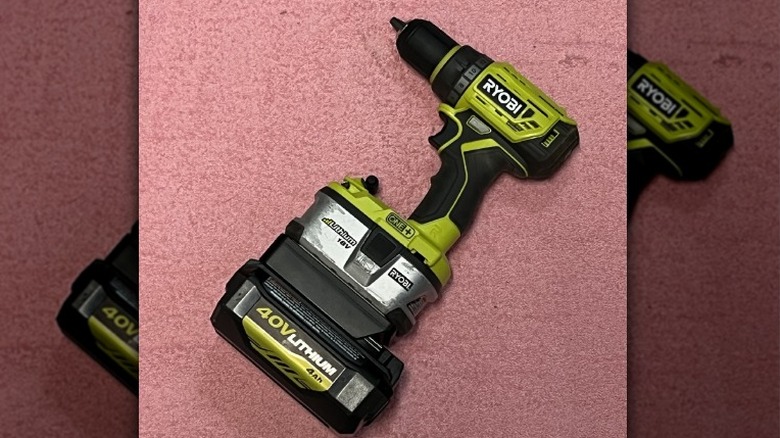Can You Use Ryobi's 40V Batteries In Your 18V Tools?
Ryobi is often regarded as one of the best power tool brands on the market due to the relatively high cost-to-performance value and the sheer volume of cordless power tools and accessories that are available in its catalog. One reason why the company making so many different kinds of products is so nice is because of the way battery systems work. Any Ryobi 18V One+ battery can power any modern Ryobi 18V tool, and because batteries are one of the more expensive aspects of collecting power tools, this allows you to get a wide range of different tools without needing to buy separate batteries.
Not all Ryobi batteries are the same, however. The company currently has four different battery systems on the market: the 18V One+ system, the 40V system, the 80V system, and the USB Lithium system. Each is sold in various kits and at varying capacities, but they are distinct systems that do not cross over into each other. So, finding the right battery for your Ryobi tool is essentially as easy as matching the voltage.
That said, some people may have wondered if there is a way to use Ryobi's more powerful 40V batteries in the company's 18V tools. The answer to that is a bit more complicated than you might think. There is technically a way to do it, but the manufacturer states that these products are not compatible, and modifying them to make them compatible is highly inadvisable.
Why Ryobi's 40V batteries don't really work on 18V tools
One of the first reasons that Ryobi's 40V batteries don't really work with the company's 18V tools is because the batteries themselves have different physical attachment layouts. Just take one look at the company's 18V One+/40V Dual Platform Charger, and you can clearly see that the fittings for the two systems are completely different, with the 40V having a more standard slide attachment with the contacts on the surface and the 18V series utilizing a cylinder that is inserted into the tool. The interlocking mechanisms, battery contacts, and placement are different on the 40V and 18V batteries, meaning that you could not physically plug the 40V battery into a tool that was designed to house the 18V without heavy modification.
On top of that, there is the matter of the flow of electricity itself. Ryobi's 18V tools are built with motors that are designed to operate on ~18V of electricity. Tools that are designed to operate at higher voltages can produce more speed and torque, but adding more juice to an 18V tool doesn't automatically equate to more power. In fact, overpowered batteries can cause overheating and even potentially melt the tool's internal components, rendering them useless due to the increased heat and electrical flow. This is because the internal wiring and other parts in the tool itself aren't rated to handle that much electricity. What's more, doing this can also void your warranty.
There are adapters that can join them, but using them might not be a good idea
It is technically possible to make Ryobi's 40V batteries work on the company's 18V tools if you use a third-party adapter. Ryobi itself doesn't make these adapters, nor does it condone their use. In fact, these don't even seem to be available from most of the third-party companies that make other Ryobi battery adapters. But there are a few DIY guides out there that promise to convert a Ryobi 40V battery into a product that will attach to and work with an 18V tool.
ToolBoyWorld, for instance, has posted a guide for how they managed to make an adapter to serve this very purpose out of a dead 18V One+ battery, a 20-amp 300W Buck converter, a Power Wheel adapter, 16GA wire, and some cardboard. Sufficed to say, methods like this don't inspire a lot of confidence for most standard users.
Even if you find a more reliable looking adapter, however, there are still a few reasons you might want to avoid using it. The Ryobi 3-Year warranty, which applies to all 18V One+ portable power tools, states that, "This warranty only covers defects arising under normal usage and does not cover any malfunction, failure, or defects resulting from misuse, abuse, neglect, alteration, modification, or repairs by other than Authorized Service Centers." Using a third party or custom made adapter that forces a 40V battery to interface with an 18V tool would constitute "alteration" or "modification" and would give Ryobi grounds to refuse to repair or replace either component in the event that one or both are damaged–an eventuality that seems quite likely given the danger that connecting a higher voltage battery poses to the tool.


